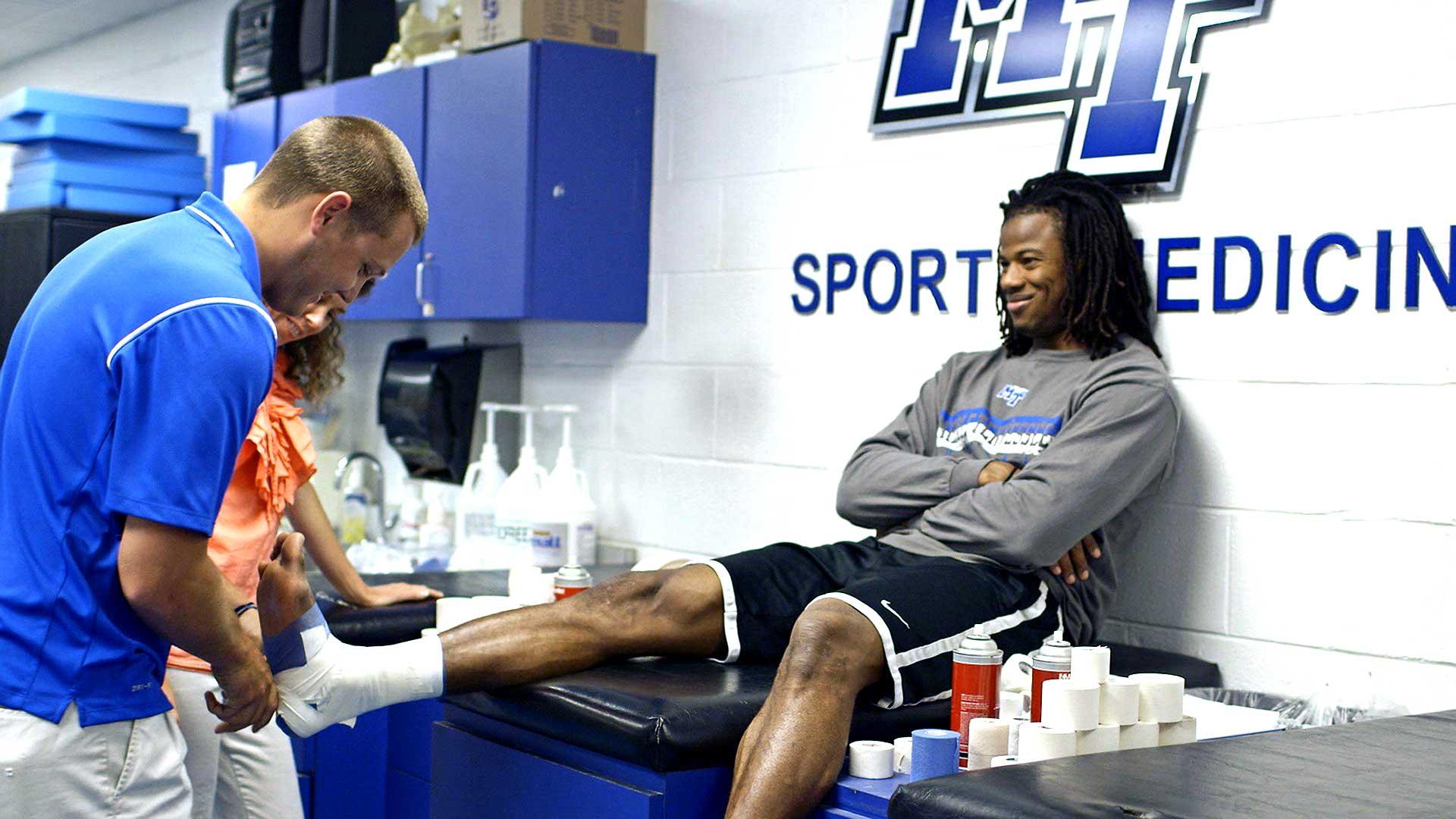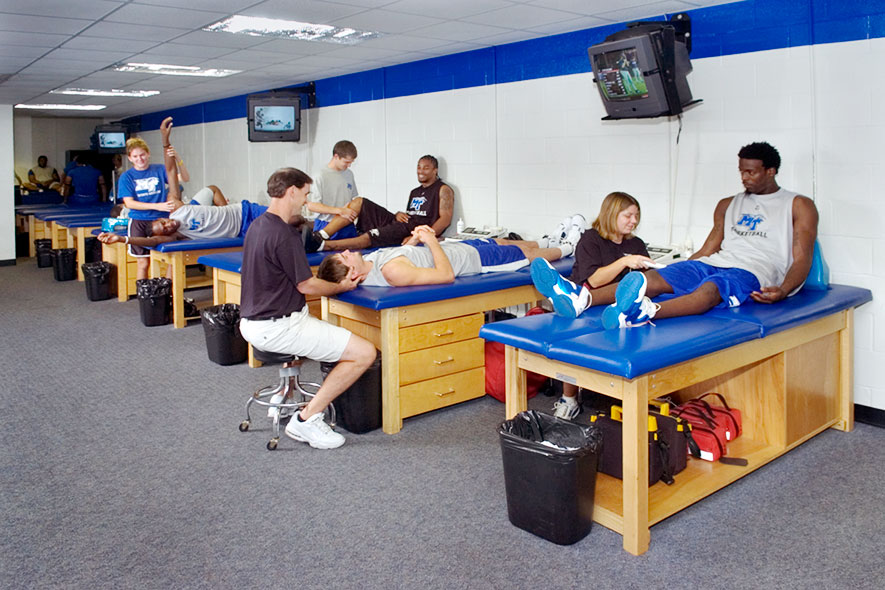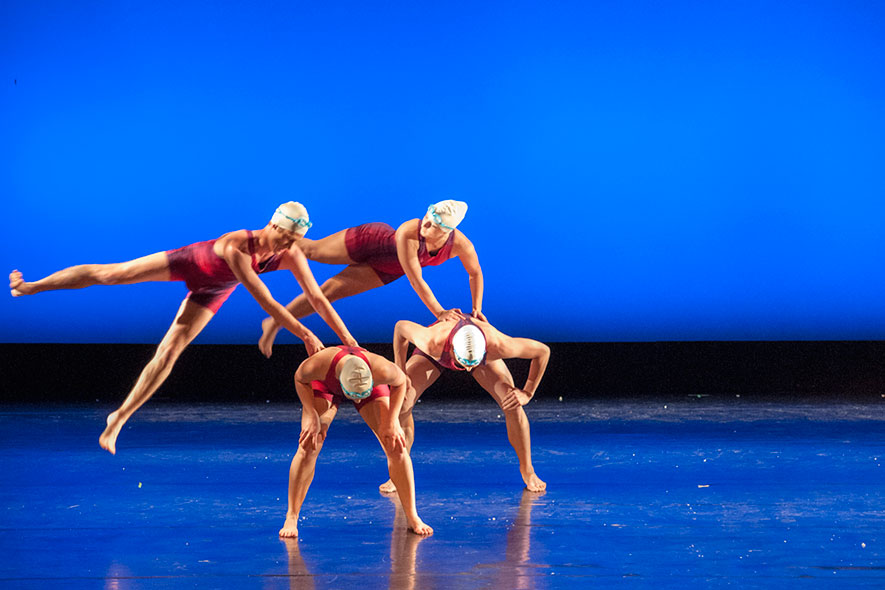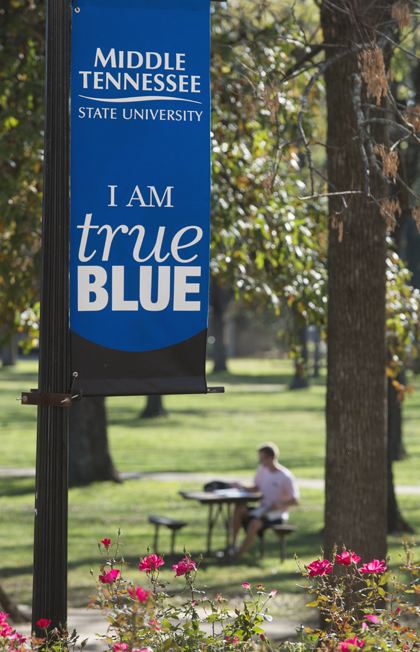
Athletic Training
Enter the dynamic world of Athletic Training. MTSU's accredited program equips students for comprehensive care in sports and health.
Athletic Training, B.S.
As hard as humans work, they often play just as hard — in the athletic arena, from collegiate and professional sports to various recreational leagues enjoyed by people of all ages. Athletic trainers are certified health care providers who impart knowledge and skill to address the many facets of athletic activity, from preventing, treating, and assessing injuries to facilitating rehabilitation and return to activity along with counseling on proper nutrition and general health and wellness. It's much more than taping a sprained ankle or standing on a sideline at a game. An Athletic Training degree from MTSU offers the skills needed to pursue this exciting career path.
Students approach preparing for this profession through a holistic integrated health care/medical model with numerous academic and clinical experiences. The program is based on the essentials and guidelines of the Commission on Accreditation of Athletic Training Education (CAATE) of the American Medical Association and the Board of Certification (BOC). The program has been accredited at the entry-level since 2002.
News Briefs

Hands-on training a must
Hands-on, clinical education experiences form a key component of the Athletic Training program, with students learning under the direct supervision of an athletic trainer. Students have opportunities for a variety of clinical experiences, ranging from working with athletic trainers for area high school and college teams to summer experiences with professional sports franchises such as the Tennessee Titans, the Tampa Bay Buccaneers, and the Arizona Cardinals. Students are also exposed to other allied health professionals such as physical therapists, physician assistants, nurse practitioners; they also have opportunities to interact with physicians. And while other university programs offer only two years of clinical experience, the MTSU program offers three years to better train students for the real world.

Not just about athletes
Think about an athletic trainer as a medical professional who is a cross between an emergency medical technician (EMT) and a physical therapist. Athletic trainers can be found in a variety of settings, from working in the performing arts arena with renowned groups such as Cirque du Soleil and Disney World and Disney Land to working within industrial and corporate settings to assist employees with proper safety measures and onsite physical rehab for workplace injuries. Other avenues in which the athletic trainer may obtain employment are with the military/law enforcement, as a physician extender, and in clinical outreach.
News Briefs
Hands-on training a must

Hands-on, clinical education experiences form a key component of the Athletic Training program, with students learning under the direct supervision of an athletic trainer. Students have opportunities for a variety of clinical experiences, ranging from working with athletic trainers for area high school and college teams to summer experiences with professional sports franchises such as the Tennessee Titans, the Tampa Bay Buccaneers, and the Arizona Cardinals. Students are also exposed to other allied health professionals such as physical therapists, physician assistants, nurse practitioners; they also have opportunities to interact with physicians. And while other university programs offer only two years of clinical experience, the MTSU program offers three years to better train students for the real world.
Not just about athletes

Think about an athletic trainer as a medical professional who is a cross between an emergency medical technician (EMT) and a physical therapist. Athletic trainers can be found in a variety of settings, from working in the performing arts arena with renowned groups such as Cirque du Soleil and Disney World and Disney Land to working within industrial and corporate settings to assist employees with proper safety measures and onsite physical rehab for workplace injuries. Other avenues in which the athletic trainer may obtain employment are with the military/law enforcement, as a physician extender, and in clinical outreach.
Related Media

Athletic trainers can find careers within a variety of organizations, from professional sports organizations to corporations interested in employee wellness to hospitals and rehabilitation clinics. Examples include
- Administrator
- Athletic trainer (high school, college, or professional settings)
- Corporate fitness and wellness
- Emergency room sports medicine liaison
- Physician extender
- Surgical and casting technologist
Employees of MTSU alumni include, but are not limited to
- Arizona Cardinals
- Baptist Hospital
- Doctors Hospital, Georgia
- East Tennessee State University
- Hamilton Medical Center, Georgia
- Southern Tennessee Medical Center
- STAR Physical Therapy
- Tennessee Orthopedic Alliance
- Trevecca Nazarene University
- Vanderbilt Sports Medicine
Athletic Training students are encouraged to join MTSU's Student Athletic TrainerAssociation(SATA). The purpose of SATA is to promote interest in athletic trainingand educate the members on relative subjects in sports medicine. Click here for more information.
Professional Organizations
Click here for a list of affiliation sites.
Written Simulation Exams
- eSims Project - McGraw-Hill Publishing Inc.
Written Exams



Professional Licensure Disclosure
The Bachelor of Science in Athletic Training (BS Athletic Training) in the College of Behavioral and Health Sciences is accredited by the Commission on Accreditation of Athletic Training Education (CAATE). Admission to the BS Athletic Training does not guarantee that students will pass the Board of Certification Exam (BOC Exam) or obtain an athletic trainer license. Successful completion of the 120-semester hour BS Athletic Training meets the educational requirements and qualifies students to sit for the BOC Exam and apply for licensure in Tennessee. Note: Admission to the BS Athletic Training is closed to new students. Prospective students interested in a career as an athletic trainer are encouraged to apply to the Master of Science (MS) in Athletic Training program.
Licensing authorities for each state set and enforce their own requirements and standards, which are subject to change. The BS Athletic Training disclosure provided on MTSU’s professional licensure disclosure website indicates the states and territories where MTSU has determined, through reasonable and good faith effort, that the program does or does not meet the educational requirements for other US states and territories. Current and prospective students not located in Tennessee or who plan to seek licensure or certification outside the state of Tennessee should contact the appropriate state licensing agency or board and discuss their plans with an advisor before enrolling in the program to ensure they have the most up-to-date information and guidance regarding licensure requirements.
Mission Statement
The mission of the Athletic Training Program (AT Program) is to produce exceptional professionals who will be contributing members to the profession of athletic training, and who possess the knowledge, skills and abilities to become proficient in the prevention, diagnosis, treatment, rehabilitation, and administration of injuries and illnesses for the physically active. A broad-based comprehensive blend of academic (didactic course work, laboratories, and hands-on learning session), clinical and professional experiences in a student-centered environment that incorporates the most recent research and technologies to meet the challenging needs of a dynamic health care environment is offered. The AT Program promotes the mission of the Health and Human PerformanceDepartment, College of Health and Behavioral Sciences, and Middle Tennessee StateUniversity through scholarship, research, and service. Designed to meet the accreditation standards established by the Commission on Accreditation of Athletic Training Education (CAATE), the AT Program, prepares students for the Board of Certification (BOC) examination.An AT Program graduate is prepared to complete graduate study in athletic training and related fields, serve the healthcare needs of the physically active, navigate a global society, be culturally competent, demonstrate legal and ethical medical practice, and display professionalism within their academics and career. Middle Tennessee StateUniversity AT Program is committed to providing a quality learning atmosphere for students pursuing athletic training regardless of race, gender, religion, national origin, disability or veteran status.
Vision Statement
The AT Program strives to become one of the leading athletic training programs in the nation and a premiere program in the southeast region and state of Tennessee. Middle Tennessee State University AT Program will produce highly qualified students for entry into the profession of athletic training.
Program Goals and Objectives
Middle Tennessee State University AT Program prepares students to become well-rounded educated individuals through program goals and objectives:
- Acquire the knowledge, skills, abilities, and competencies included in the NationalAthletic Trainers' Association (NATA) Athletic Training Educational Competencies 5th ed., and meet the standards and guidelines established by the CAATE, while preparing students to sit for the BOC for Athletic Training to become a professional athletic trainer.
- Promote students to think logically, critically, and creatively, and to make sound judgement and decisions in a supervised environment, under qualified faculty, medical, and health care professionals.
- Ensure quality clinical experiences that allow students to appreciate the role of an athletic trainer in a variety of practice settings with diverse patients and clients in athletics, work, and life.
- Promote effective communication techniques and strategies to build positive professional relationships with patients, administrators, other healthcare providers, and the public.
- Prepare students to acquire and integrate research into daily clinical practice through the practice of evidence-based medicine.
- Promote professionalism and the importance of ethical practice.
- Encourage active engagement in university, community, and professional activities that develop leadership and role-modeling skills while sharing knowledge, expertise, and creative activities.
- Prepare qualified healthcare professionals to successfully gain employment (in colleges, high schools, professional sports, sports medicine clinics, and other athletic training/sports medicine agencies) or continue on to post-professional education.
Program Student Learning Outcomes
The AT Program has specific student learning outcomes based on the expectations ofMiddle Tennessee State University and the Department of Health and Human Performance.Students will be able to:
- Demonstrate effective communication, both orally and in writing.
- Demonstrate discipline-specific content knowledge.
- Analyze and think logically, critically, and creatively to make sound judgments in problem-solving situations.
- Demonstrate knowledge of diverse cultural needs and abilities.
- Apply professional skills and research in discipline-specific situations.
- Value lifelong learning through professional advocacy and participation.
- Demonstrate knowledge of ethical practice.
The AT Program has several program specific outcomes. The AT Program will:
- Assemble and maintain high quality faculty, medical, and health care professionals as supervisors and preceptors in the AT Program.
- Arrange and select a variety of clinical sites and practice settings with diverse patients and clients in athletics, work, and life.
- Collect and assess information on employment and/or post-professional education placements in athletic training.
- Evaluate the overall effectiveness and student satisfaction of the AT Program.
- Report and evaluate BOC pass rates.
- Report and measure graduation and retention rates in the AT Program.
Admission Criteria
Prior to be considered as a candidate for admission into the program, a student must have completed a letter of application including 3 three recommendations. The student must have also completed 24 hours of academic course work and have a minimum overallGPA of 2.5. After meeting these requirements, acceptance into the program is based upon 4 four weighted criteria. (See Application Score Sheet under Forms and Manuals for Prospective Students, below.) In order to be guaranteed admission to the AthleticTraining Program applicants must score a 110/120 possible points, with lower scores being considered until the maximum seats for the program have been filled.
| Overall grade point average of 2.5 or better | 30 pts |
| Grade of B- or better in ATHT 3580, ATHT 3570, BIO 2010 | 15 pts |
| Clinical Evaluation (which includes 20-30 observation hours) | 45 pts |
| Interview | 30 pts |
| Total points | 120 pts |
What Does it Cost?
Athletic Training Program Costs
Athletic training students pay the same fee schedules as do all other undergraduate students at the University. These fees are described in detail elsewhere in this catalog.Additional expenses incurred by athletic training students include:
- the cost of a uniform package — approximately $100-150 (ATHT 3000);
- liability insurance - approximately $35 (yearly);
- membership into the National Athletic Trainer's Association — approximately $80-100(yearly);
- maintenance of professional rescuer CPR- approximately $30-50 (yearly);
- verification of immunization (cost depends on where immunization is received);
- their own transportation to and from clinical sites including, but not limited to, vehicle and fuel costs.
- the cost of a background check, if required by the clinical site — approximately $40(when required by clinical site).
Clinical sites may be assigned to a student within a 60-mile radius of the MTSU main campus. Students are required to have a minimum of three off-campus clinical rotations, with a maximum of six off-campus clinical rotations, to complete the clinical component of the Athletic Training Program.
Forms and Manuals
For more information about the Athletic Training program, you may contact: Dr. Helen Binkley, Department of HHP, MTSU, Box 96, Murfreesboro, TN 37132. (615) 904-8192 or [email protected].

CONTACT US

Please fill in the form below and we will contact you very soon












